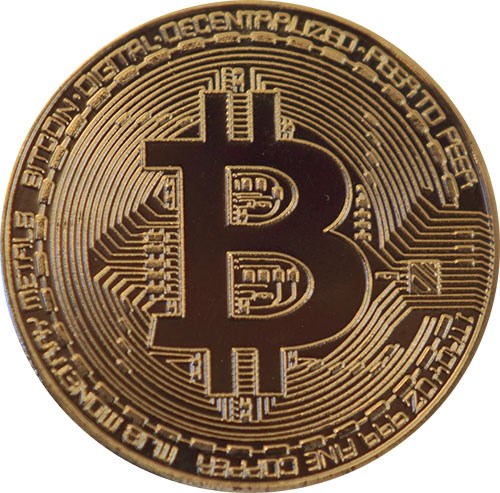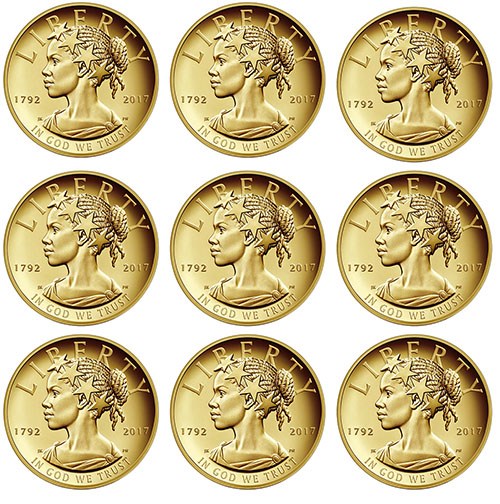What is Real Money?
Posted on 12/14/2017
By
Jeff Garrett
Unless you have been living under a rock in recent weeks, you have probably heard of the incredible rise in the price of Bitcoin. As of yesterday, one Bitcoin equaled about $17,000.
In 2010, the price of one Bitcoin peaked at $0.39. A $1,000 investment in 2010 would now be worth about $45 million.
There has probably never been an asset that has risen that much in the history of financial investments. After listening to the pundits all day on the financial news networks, it’s hard to know if Bitcoin is the next great thing, or the biggest bubble of all time.
 |
 |
| It costs roughly the same (at the time of this writing in December 2017) to acquire one Bitcoin as it does to acquire nine American Liberty US Mint 225th Anniversary Gold $100 coins, which each contain one ounce of gold. (At left is a commemorative from a private mint, not an actual Bitcoin.) | |
Because of the word “coin” in its name, it’s amazing how many people think that a coin dealer can give them insight and advice about investing in Bitcoin. That alone tells you how little the average person knows or understands about Bitcoin.
I would be the first to admit that my understanding of Bitcoin and the underlying blockchain technology is rudimentary at best. I do, however, have an interest in anything that has been compared to money and might be used as currency. It’s also fascinating to contemplate how this new potential replacement for money could impact what we all consider real money — precious metals. And whether we like it or not, the price of precious metals does have an impact on the rare coin market.
What is Bitcoin?
Bitcoin is a form of cryptocurrency and payment system that was created in 2009 by someone using the alias Satoshi Nakamoto. The system is based on complex mathematical computations with a finite limit on how many Bitcoins can be created over time. The creation of Bitcoin is called mining, with some comparing the process to mining for gold: It’s expensive and hard to do.
The created currency, Bitcoin, can be used to make transactions around the globe without middlemen (banks). Bitcoins can be bought on digital currency exchanges, and used for purchases, speculation, or as a hedge against currency. For now, the speculation component seems to be the compelling attraction.
Why buy Bitcoin?
There are many advantages to the creation of a decentralized (no governmental involvement) cryptocurrency such as Bitcoin.
If the payment system becomes widely accepted at some point in the future, financial transactions could be made with much lower middleman costs, such as credit card fees. Credit card fees cost vendors a few percentage points for most transactions, and generate billions of dollars for banks around the world.
Transactions can also be made anonymously, without governmental oversight. By having money in Bitcoin, you would also be free of currency fluctuations or devaluation. One could easily see the appeal if you lived in a country with rampant inflation or hyperinflation.
Bitcoin is also a speculation in the very future of what will be considered money. If Bitcoin becomes widely accepted in the future, its value could soar. Some proponents have tossed out figures as high as $1 million in the next 20 years for one Bitcoin. Some form of digital money could replace traditional currency in the future, and this could have a profound impact on numismatics.
What are the downsides of Bitcoin?
Speculation has been the main driver for Bitcoin prices in recent weeks and months. With this kind of market volatility, Bitcoin could not be feasibly considered an alternative currency for everyday use. It will be some time before its true value as currency has been established.
Many of the smartest men and women in the country have stated publicly that Bitcoin is nothing more than a Ponzi scheme or speculative bubble. Some have compared the price bubble to the tulip bulb mania that swept the Netherlands in the early 17th century.
As mentioned above, Bitcoin can be used to make transactions anonymously. This may sound like a positive, but you can be sure that governments around the world do not want their citizens to have this ability. The market for Bitcoin is unregulated, and if the cryptocurrency becomes widely used, you can be sure governments will implement rules for its usage.
The use of Bitcoin has already been tied to criminal activity and is the preferred method of payment on the “dark web.” If you are ever audited by the IRS, one of the first questions they ask is about off-shore bank accounts. I would not be surprised if future tax forms have sections dealing with cryptocurrency.
One of the biggest concerns to me would be cybersecurity. If Bitcoins are anonymous and untraceable, how do you protect yourself from cyber theft? There have already been cases of Bitcoins missing from trading exchanges over the last several years.
Another concern is the enormous amount of energy required for computers to generate Bitcoins. The amount of energy needed is staggering, and will only increase over time as the system makes mining Bitcoin more difficult. It could make conventional mining look “green” by comparison.
Finally, Bitcoin is just one of many cryptocurrencies that have been created in the last several years. How does one cryptocurrency maintain its acceptance and validity versus dozens, if not hundreds, of competitors? It reminds me of a saying in the rare coin business: “There are now an unlimited number of limited editions.”
Bitcoin and cryptocurrencies have been around for less than 10 years. Gold and silver have been considered a store of money and value for nearly 3,000 years. Regardless of what finally happens to cryptocurrencies, there will be many who want the security of something tangible. Cryptocurrencies are the polar opposite of a tangible asset. Most people do not buy gold and silver for speculation, but rather as insurance against financial calamity, such as occurred in 2008-2009.
Gold and silver will probably suffer somewhat while so much attention is being focused on this new asset class. In my opinion, precious metals will always have an important role in the world’s monetary system. It may change, but a 3,000-year track record is pretty solid.
That being said, it probably behooves all of us to pay attention to new technologies and how they can change the world. I’m sure none of us older folks could have ever predicted 25 years ago the impact that the internet would have on our lives. The future of the rare coin market can be affected by many forces, and it’s important to be aware of how the world is changing. If you’re determined to invest in cryptocurrencies, do your homework first.
Maybe in the future, the typical coin shop will include Bitcoin in its offerings. We could definitely use the business!
Want to see more articles like this? Subscribe to the free NGC Weekly Market Report.
Stay Informed
Want news like this delivered to your inbox once a month? Subscribe to the free NGC eNewsletter today!
